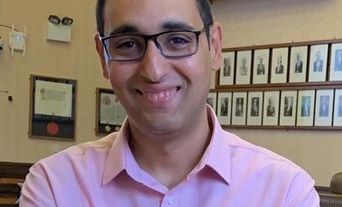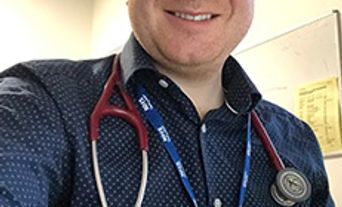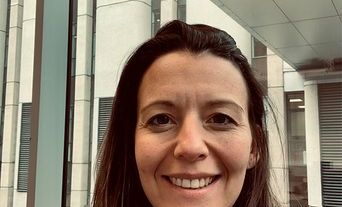Education, specialty and career pathway
I graduated from the University of Manchester with an honours in medicine and a distinction in a master’s in medical research. I completed my foundation training in Central Manchester University Hospitals NHS Foundation Trust and went on to receive core medical training in Lewisham Hospital and Guy’s and St Thomas’ NHS Foundation Trust. It was a job in the haematology department at Lewisham Hospital that I found truly exciting and which ultimately inspired me to pursue a career in haematology. I enjoyed the variety offered by a career in haematology in both providing care for people with blood disorders and supporting other healthcare services. In 2013, I was awarded an Academic Clinical Fellowship in haematology by the National Institute of Health Research (NIHR) in south-west London.
This led to a Cancer Research UK (CRUK)-funded PhD at the Institute of Cancer Research (ICR) under the supervision of Professor Richard Houlston. I was then accepted onto the Visiting Scientist Fellowship Scheme at the German Cancer Research Centre (DKFZ) in Heidelberg, Germany. Following this, I was awarded the NIHR’s Academic Clinical Lectureship at the ICR and Royal Marsden Hospital. I am continuing my haematology training in south-west London, based in the NHS Foundation Trusts at the Royal Marsden, St George's University Hospitals, and Epsom and St Helier University Hospitals.
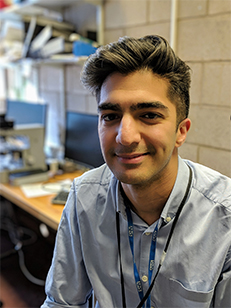
Key achievements
CRUK-funded PhD fellowship in the Division of Genetics and Epidemiology
I was awarded CRUK funding for a clinical PhD fellowship at the Division of Genetics and Epidemiology at the ICR. During this fellowship, I studied the genetics and epidemiology of Hodgkin lymphoma. This required international collaboration and resulted in a number of publications in journals such as Nature Communications and the Journal of Clinical Oncology and Blood. I consequently received further funding for an ICR/NIHR academic clinical fellowship, and was awarded prizes such as the Royal College of Physicians’ Turner–Warwick prize. The fellowship also provided opportunities for a great deal of professional and personal development, for example in academic supervision, critical thinking and writing. I worked under the supervision of Professor Richard Houlston, who has been a supportive and inspiring mentor.
Receiving the RCPath Research Medal in Haematology
Another of my main achievements was when I participated in a Visiting Scientist Fellowship at the DKFZ, Germany with Professor Kari Hemminki, which led to further publications and ongoing academic collaborations. I enjoyed the cultural and academic exchange that this visiting scientist fellowship facilitated, and the benefits of this experience will be long-lasting. I was awarded a Research Medal by the College in recognition for my work in characterising second cancer risk in individuals with Hodgkin lymphoma.
Combining clinical and post-doc training as an academic clinical lecturer
I was the recipient of an NIHR/ICR academic clinical fellowship. This has allowed me to continue my clinical training under the excellent supervision of haematologists in south-west London, to obtain my fellowship to the Royal College of Pathologists and to expand my academic interests. I have been the recipient of a number of awards and grants during this time, including the Academy of Medical Sciences’ Starter Grant for Clinical Lecturers, the Royal College Whitney–Wood Scholarship and Biomedical Research Centre grants.
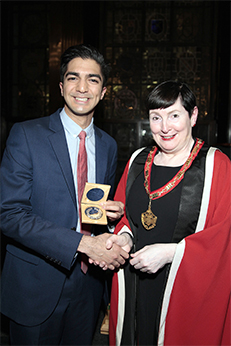
Challenges
One of the key challenges that the specialty faces is continuing to deliver excellent care in the context of increasing complexity, in relation to our understanding of disease, diagnostics and interventions. Another challenge that pathologists face is preserving training in the presence of changing working practices and increasing workload.
Solutions
Regular updates to the curriculum as well as developing and making consistent use of new technologies such as remote teaching and digital pathology will help ensure trainees are given the best opportunity to fulfil their professional goals. I think it would also help to consolidate training where possible (e.g. with locations for regional training) while maintaining local training opportunities. These changes are being implemented and my colleagues and I are already benefiting from this.
It’s critical to ensure that dedicated time given for training is preserved.
Inspiring trainees
I think a greater emphasis in undergraduate training on pathology and its importance would help inspire people to pursue a career in pathology. I believe more trainees would be encouraged to become pathologists if there were improvements in the visibility of pathology, at a local level, with taster sessions or teaching, and at the national level. There are many individuals who are great role models for pathology, including Dr Matthew Clarke and Dr Suzy Lishman.
I am thoroughly enjoying my clinical and academic training and feel very fortunate to work with and learn from bright, caring and dedicated individuals. The changing and varied practice and the need to work as part of a team are particular features of haematology and pathology that appeal to me.


